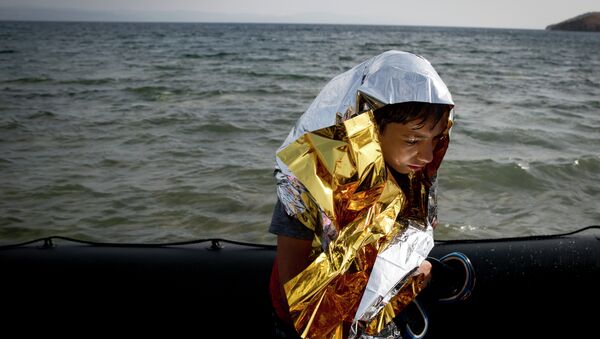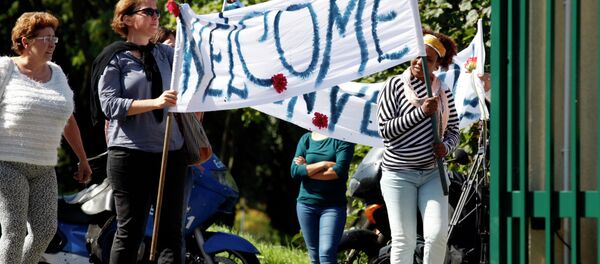British officials revealed that they would still end up paying for the EU refugee proposals unveiled by European Commission President Jean-Claude Juncker yesterday, despite not taking part themselves.
I met today perm. representatives of 28 MS to discuss #SOTEU & prepare extraordinary JHA Council 14/9 #Refugeecrisis pic.twitter.com/TZZHRWqufZ
— Jean-Claude Juncker (@JunckerEU) September 10, 2015
Under the "bold plans", 160,000 refugees would be relocated among EU member states, in what Juncker described as Europe's greatest migration crisis since the Second World War.
The plans are aimed at easing the pressure on periphery EU states such as Greece, Hungary and Italy, who have been struggling to cope with the recent influx of refugees fleeing Syria and other war-torn countries in the Middle East.
'Europe Has to Reach Its Own Answers'
Britain is exempt from EU asylum and migrations policy as a result of longstanding treaty opt-out clauses, with David Cameron taking to parliament to express his opposition to joining such a quota-based plan.
"If all the focus is on redistributing quotas of refugees around Europe, that won't solve the problem and it actually sends a message to people that actually it's a good idea to get on a boat and make that perilous journey," he said.
"Europe has to reach its own answers, for those countries that are part of Schengen [zone]. Britain, which has its own borders, has the ability to make sovereign decisions."
The Prime Minister of Monday announced that the UK would take in 20,000 Syrian refugees over the next five years as part of its own relocation program.
While many praised the increase in asylum places designated for Syrian refugees, others scoffed at the increase, arguing that it paled in comparison to other countries, with Germany expected to accept in excess of 800,000 refugees into the country this year.
The UK will resettle up to 20,000 Syrian refugees over the course of this Parliament as part of our comprehensive response to this crisis.
— David Cameron (@David_Cameron) September 7, 2015
Others contrasted the UK's decision to accept 20,000 Syrian refugees over the next five years — at an average rate of 4,000 per year — to the 20,000 people who arrived in Munich last weekend, after Germany announced it would scrap EU rules forcing refugees to lodge their asylum claims in the country in which they first entered the EU.
Debate Over Aid Plans
With the UK expected to opt out of the EU quota plan, the revelation that the country will be forced to pay $140 million (£90m) of the bill will anger Britain's Eurosceptics, who have long argued that the UK should leave the EU in order to give the country more control over issues such as immigration and controlling its borders.
The decision to fund the project in part will also be seen as contradictory, given that David Cameron has warned against taking part in such programs that he believes will encourage people to make the dangerous voyage to Europe.
1.4 million welcomes for refugees to be presented to Cameron by Amnesty and other refugee orgs http://t.co/iHLwYxNVfp pic.twitter.com/qfEc4v2lAd
— AmnestyUK Media Team (@NewsFromAmnesty) September 9, 2015
Meanwhile, others have suggested that the government appears content to spend money to keep vulnerable people overseas, rather than accept them into the UK.
To put the additional $140 million contribution into context, UK government officials say they have committed "more than any other country in the world except the United States" to the humanitarian crisis with $1.5 billion (£1 bn) spent on a wide range of aid programs.
"The UK is the only EU country to fulfill its pledge to provide 0.7% of GDP to international aid and we should be proud of this," a government statement said.
"By the end of March 2015, UK support had delivered over 18 million food rations, each of which feeds one person for one month, provided access to clean water for 1.6 million people (peak month), and over 2.4 million medical consultations in Syria and the region."





